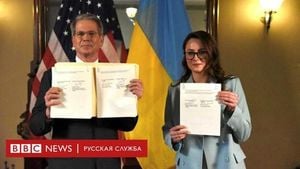The tennis tour, glamorous on the surface, can often feel isolative for its players. Nowhere is this sentiment felt more acutely than with Elena Rybakina, who finds her focus increasingly diverted due to controversy surrounding her former coach, Stefano Vukov. Their professional relationship, once leading her to triumph at the 2022 Wimbledon, has turned fraught with allegations of abusive conduct and manipulation.
Rybakina’s decision to part ways with Vukov came just before the 2024 U.S. Open, where whispers of trouble first solidified. Following multiple complaints about Vukov’s coaching style, the Women’s Tennis Association (WTA) launched an investigation. This scrutiny culminated with the body’s decision to impose Vukov’s one-year suspension for violating the code of conduct, which was made public on January 31, 2025.
Vukov’s dismissal was not out of the blue. Describing her situation, Rybakina expressed to Tennis.com, “No one offered any support. Honestly don’t need. There’s couple players I’m in touch with more but to say I have very, very close friends on tour isn’t true.” Her words reflect not just her struggles with Vukov but also her feelings of isolation within the competitive sphere of tennis.
The tension reached unprecedented levels during the U.S. Open, where Vukov allegedly attempted to convince Rybakina of her dependency on him, roaming the hallways of her hotel, persistently calling and texting her—100 times according to reports. This alarming behavior prompted Rybakina’s team to notify WTA officials out of concern for her safety.
Coco Gauff and Iga Swiatek, fellow players and potential allies, publicly emphasized the importance of ensuring player safety. Gauff noted, “From my understaning, I know she doesn’t like the decision. I know WTA also has the right to protect her.” Likewise, Swiatek highlighted the necessity for all coaches to respect the WTA’s regulations and create safe environments. These collective voices have contributed to affirming personal safety over professional relationships.
Despite these declarations of support, Rybakina has often felt abandoned. Reflecting on her experience with Vukov, she later stated, “I’m just disappointed with the situation and how the process went. It’s not the best time, but I want to perform as best as I can.” The disparate responses from fellow players have led Rybakina to question the strength of friendships within the sport.
The undercurrents of discord traced back to incidents at tournaments dating back years. Coaches and players alike reported troubling encounters—ranging from verbal abuse during practice sessions to belittling remarks aimed at Rybakina. During the Miami Open, instances of Vukov deriding Rybakina’s intelligence were alarmingly documented. Such behavior raised eyebrows and eventually led to formal complaints directed to WTA officials.
The WTA’s findings outlined Vukov’s violations, which included engaging in emotional and verbal abuse, and exploiting the coach-player dynamic for personal gain. Rybakina’s mother captured the tone of concern, having reached out directly to Vukov, pleading with him to avoid making her daughter cry again. This troubling request only compounds the gravity of the situation.
With Vukov’s misconduct laid bare, the WTA took decisive action, implementing a provisional suspension. The message was clear: the governing body stood firmly behind the principle of safeguarding players. Yet, the worries surrounding Rybakina’s emotional well-being grew as reports indicated she was battling insomnia and withdrawal from competition during key tournaments. Her friends and coaches watched with worry as her physical health declined under the strain of these events.
Now, with her mind too often preoccupied with past traumas, Rybakina looks to the current season and the road to recovery. Stepping up as her temporary coach is Davide Sanguinetti, who has taken over Rybakina’s coaching duties during Vukov’s suspension. Their partnership marks a new chapter, one aiming to distance Rybakina from the emotional scars of the previous year and replenish her competitive spirit.
The saga continues to evolve, with Rybakina’s public statements hinting at the turbulence beneath her professional surface. While many rooted for her resurgence, she’s haunted by the memories of Vukov’s behavior—his continued attempts to make contact during his provisional ban only serve to cloud, rather than clarify, her path to victory.
Elena Rybakina stands at the crossroads of personal healing and professional ambition. Whether the WTA’s actions will truly protect her remains to be seen. The tennis world collectively hopes she can regain her focus and emerge stronger from the shadows of the past.



